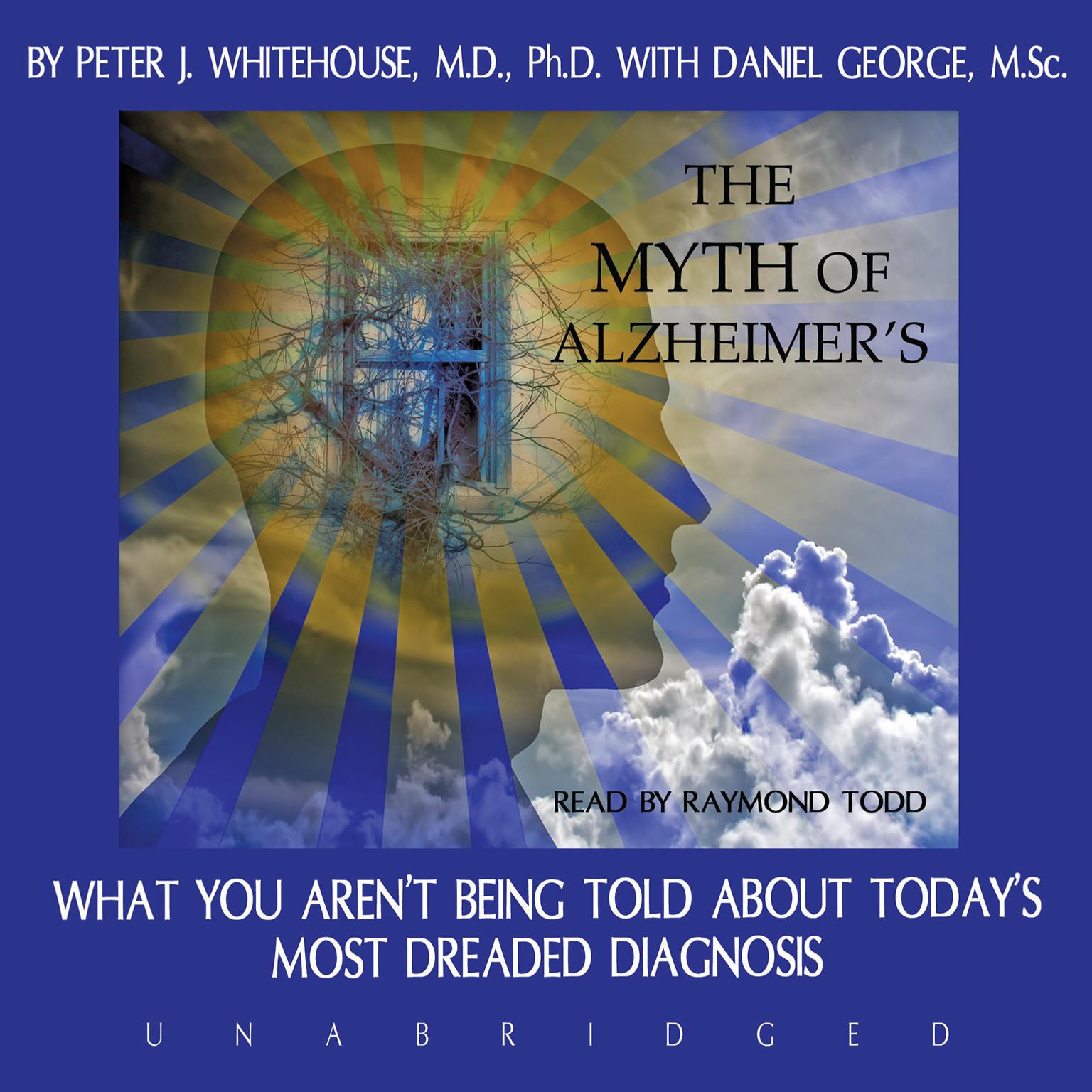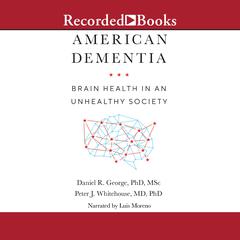 Play Audiobook Sample
Play Audiobook Sample
The Myth of Alzheimer’s: What You Aren’t Being Told about Today’s Most Dreaded Diagnosis Audiobook
 Play Audiobook Sample
Play Audiobook Sample
Quick Stats About this Audiobook
Total Audiobook Chapters:
Longest Chapter Length:
Shortest Chapter Length:
Average Chapter Length:
Audiobooks by this Author:
Publisher Description
Leading gerontologist Peter J. Whitehouse presents his provocative approach to aging and senility, calling for a relabeling of age-associated cognitive challenges. In a call to arms to reevaluate the way we think about and deal with Alzheimer’s disease, he claims that the current view of Alzheimer’s as a virtual death sentence obscures the potential for vitality and wisdom that still exists in the graying years.
The Alzheimer’s label too often generates fear, paranoia, and anxiety. By taking a closer look at what Alzheimer’s is and isn’t, Whitehouse offers hope to families as well as to those who suffer from a decline in their cognitive abilities. Using examples from his own practice and from around the world, he presents a new approach to the treatment of brain aging and provides practical advice for getting the best level of care.
Download and start listening now!
"Very interesting ideas relating to brain aging. To sum it up: mind over matter. If one and one's doctor has a positive attitude towards brain aging it can not be a death sentence. "
— Jane (4 out of 5 stars)
Quotes
-
“A thought provoking book that raises important questions about later life cognitive decline and Alzheimer disease.”
— Peter V. Rabins, MD, MPH, Johns Hopkins School of Medicine, co-author of The 36-Hour Day -
“A landmark book.”
— Harry R. Moody, Director of Academic Affairs, AARP -
“Dr. Peter Whitehouse tackles with courageous candor current myths about ‘Alzheimer's disease’ and offers an alternate, realistic and holistic approach to healthy and dignified aging.”
— Vladimir Hachinski, MD, FRCPC, DSc Distinguished University Professor University of Western Ontario University Hospital -
“Bold, provocative, and compassionate.”
— Ann Davidson, author of Alzheimer’s: A Love Story and A Curious Kind of Widow -
“This book is of enormous relevance to persons concerned about and struggling with significant changes in cognitive functioning, as well as to family members, caregivers, clinicians, researchers, community program planners, and policy makers.”
— Gene D. Cohen, MD, PhD, author of The Mature Mind: The Positive Power of the Aging Brain -
“A book full of profound and practical wisdom.”
— Jesse F. Ballenger, PhD, author of Self, Senility, and Alzheimer’s Disease in Modern America -
“Deliberately provocative, carefully researched, and lovingly rendered.”
— Anne Basting, Director, University of Wisconsin, Milwaukee, Center on Age & Community, author of Forget Memory
The Myth of Alzheimer’s Listener Reviews
-
" Interesting book. Whitehouse is very full of himself, but he includes some good information. I especially liked the sections on preventive care. "
— Tory, 9/20/2013 -
" Very interesting ideas relating to brain aging. To sum it up: mind over matter. If one and one's doctor has a positive attitude towards brain aging it can not be a death sentence. "
— Jane, 8/13/2013 -
" The information is current, but the author's voice is too arrogant for me. "
— Joyce, 7/21/2013 -
" There is some good information here, despite the puzzling title. Much repetition, but I suppose that's needed in memory loss. "
— Laurele, 8/6/2012 -
" I heard the author speak at the U of M. This book provides a controversial new way to think about brain aging. "
— Nancy, 6/24/2012 -
" I agree with most of his basic points -- but didn't really get why he kept trumpeting his point of view as so radical and new. Yes, maybe 15 years ago. It's an OK book but it wasn't what I was hoping for. "
— Natalie, 5/14/2012 -
" A very interesting and positive approach to brain aging, except for too much on the science and effects of prescriptions. "
— Mike, 2/5/2012 -
" Should be read by anyone concerned about Alzheimers "
— James, 5/21/2011 -
" A leading clinician and researcher makes a convincing case that Alzheimer's is a flawed, counter-productive diagnosis, a disease without a single cause or likely cure. He seeks to help people live in a preventative way and then deal with the challenges of an aging brain in life-affirming ways. "
— Sally, 4/21/2011 -
" There is some good information here, despite the puzzling title. Much repetition, but I suppose that's needed in memory loss. "
— Laurele, 5/29/2010 -
" I heard the author speak at the U of M. This book provides a controversial new way to think about brain aging. "
— Nancy, 8/18/2009 -
" Should be read by anyone concerned about Alzheimers "
— James, 5/3/2009 -
" A very interesting and positive approach to brain aging, except for too much on the science and effects of prescriptions. "
— Mike, 1/20/2009 -
" I agree with most of his basic points -- but didn't really get why he kept trumpeting his point of view as so radical and new. Yes, maybe 15 years ago. It's an OK book but it wasn't what I was hoping for. "
— Natalie, 9/16/2008 -
" The information is current, but the author's voice is too arrogant for me. "
— Joyce, 9/2/2008 -
" A leading clinician and researcher makes a convincing case that Alzheimer's is a flawed, counter-productive diagnosis, a disease without a single cause or likely cure. He seeks to help people live in a preventative way and then deal with the challenges of an aging brain in life-affirming ways. "
— Sally, 3/30/2008
About Peter J. Whitehouse
Peter J. Whitehouse, MD, PhD is the director of integrative studies in the Department of Neurology at Case Western Reserve University and is the founding director of the University Memory and Aging Center at Case. He is a clinician at ElderHealth Center at University Hospital of Cleveland.
About Raymond Todd
Raymond Todd is an actor and director in the theater as well as a poet and documentary filmmaker. He plays jazz trombone for the Leatherstocking quartet, an ensemble that gets its name from one of his favorite Blackstone narrations, The Deerslayer. Todd lives in New York.




